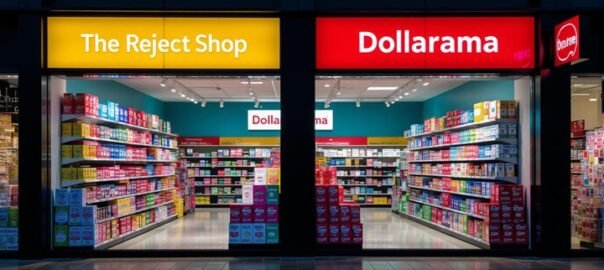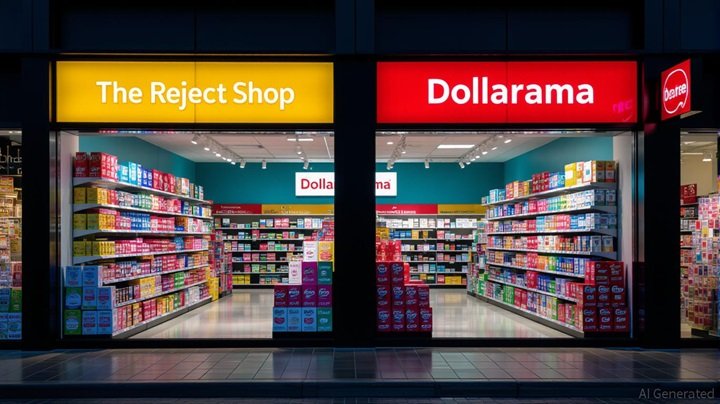
Dollarama’s Strategic Acquisition of The Reject Shop and Its Implications for Global Value Retail
The acquisition of The Reject Shop Limited by Dollarama Inc. in July 2025 marks a pivotal moment in the evolution of global value retail. By securing Australia’s largest discount retailer, Dollarama has not only expanded its geographic footprint but also demonstrated a masterclass in leveraging cross-border synergies to create long-term value. This move, however, is not merely a transactional exercise—it is a strategic recalibration of the company’s global ambitions, underpinned by a deep understanding of market dynamics, operational efficiency, and consumer behavior.
The Strategic Rationale: A Calculated Leap into Australia
The Reject Shop’s acquisition was structured as an all-cash deal, with Dollarama paying A$6.68 per share, a 108% premium over The Reject Shop’s 20-day volume-weighted average price. This valuation, while aggressive, reflects the target’s robust performance: The Reject Shop reported consolidated sales of A$866 million for the year ending December 2024, with a gross profit margin of 40.64% and EBIT growth of 16.2% in H1 2025. Dollarama’s ability to secure such an asset at a premium is a testament to its confidence in the scalability of the Australian dollar-store model, particularly in a market where offline retail still accounts for 88.56% of total sales.
The strategic rationale is rooted in complementary strengths. The Reject Shop’s 390+ stores, strategically located in high-traffic urban and suburban areas, align with Dollarama’s expertise in high-turnover inventory and cost control. Australia’s dollar-store sector, projected to grow at a 3.3% CAGR through 2025, is being driven by inflationary pressures and a shift toward private-label products. Dollarama’s integration of its global sourcing network and margin management expertise could further compress costs, a critical differentiator in a sector with razor-thin margins.
Cross-Border Synergies: Operational and Supply Chain Advantages
The acquisition’s true value lies in its operational and supply chain synergies. Dollarama’s experience in Canada and Latin America—where it operates over 1,300 stores and owns the discount chain Dollarcity—provides a proven playbook for optimizing inventory turnover and reducing procurement costs. The Reject Shop’s existing infrastructure, including its 1.5% comparable store sales growth in H1 2025, offers a ready-made platform for these efficiencies.
Moreover, the combined entity can leverage economies of scale in sourcing, logistics, and technology. For instance, The Reject Shop’s reliance on national brands could be complemented by Dollarama’s private-label expertise, which has historically driven higher margins. The integration of digital tools—such as mobile apps and online ordering—further enhances the omnichannel experience, a critical factor in retaining Gen Z and millennial shoppers.
Long-Term Market Expansion: Beyond Australia
While the Australian market is a cornerstone of Dollarama’s strategy, the company’s ambitions extend far beyond its new acquisition. The expansion of The Reject Shop’s store count from 390 to 700 by 2034 is a bold but achievable target, particularly given Australia’s demographic trends and the growing demand for affordable goods. However, the true test of Dollarama’s vision lies in its ability to replicate this success in other markets.
In Latin America, Dollarama has already increased its stake in Dollarcity, a discount retail chain projected to double its store count in Colombia, Peru, El Salvador, and Guatemala by 2030. This expansion is underpinned by similar macroeconomic factors driving growth in Australia: inflationary pressures, rising income inequality, and a shift toward value-driven consumption. The company’s recent foray into Mexico, though not yet detailed, signals a commitment to leveraging its North American success in new markets.
Risks and Mitigations: A Cautionary Lens
No acquisition is without risk. Integrating The Reject Shop into Dollarama’s operational model requires careful execution to avoid cultural clashes or operational friction. Australia’s retail landscape is also fiercely competitive, with established players like Aldi and Wesfarmers (owner of Kmart) aggressively expanding their value offerings. Dollarama’s reliance on physical retail—while currently well-positioned—could become a liability if online retail accelerates faster than anticipated.
However, the company’s financial strength mitigates these risks. The Reject Shop’s balance sheet, with A$75 million in cash and no debt, provides a buffer for strategic investments. Dollarama’s funding of the acquisition through cash reserves and its revolving credit facility ensures minimal immediate impact on its net earnings per share or adjusted net debt-to-EBITDA ratio.
Investment Thesis: A Compelling Case for Long-Term Value
For investors, the acquisition represents a compelling case for long-term value creation. The integration of supply chain synergies, operational efficiencies, and economies of scale supports margin expansion and growth potential in a market with a decade-long runway. Dollarama’s diversification across Canada, Latin America, and Australia reduces regional economic risks, making it a well-positioned player in the global value retail competition.
Moreover, the company’s track record of disciplined capital allocation and margin management—evidenced by its consistent EBIT growth in Canada—suggests that the Australian acquisition will be no different. The projected 7.34% CAGR in Western Australia’s dollar-store market further underscores the long-term sustainability of the model.
Conclusion: A Blueprint for Global Value Retail
Dollarama’s acquisition of The Reject Shop is more than a regional expansion—it is a blueprint for global value retail in an era of rising inflation and shifting consumer preferences. By combining The Reject Shop’s established presence with Dollarama’s operational rigor, the combined entity is well-positioned to dominate the Australian dollar-store sector while laying the groundwork for further international expansion. For investors, this represents a rare opportunity to participate in a company that is not only adapting to macroeconomic tailwinds but actively shaping the future of retail.
Author Credits- Edwin Foster
AINVEST






